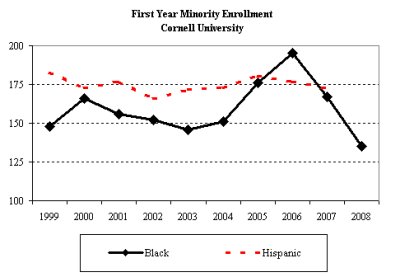This is the first in a continuing series on the issues surrounding Cornell's new financial aid policy. There were three key motivations behind the University's recent expansion of its financial aid policy, which not only adopted no parental contributions for any student with a family income less than $60k, but explicitly offers better aid packages to select students from families with a family income greater than $60k in what essentially becomes an underhanded merit-based aid policy: The plan: -- Will try to keep Cornell competitive in wooing common admits with non-Ivy schools that offer significant merit based aid to students, like Northwestern, CMU, or Washington University in St. Louis. It's hard to track down definitive public data on this trend, but the anecdotal evidence has suggested that it has been a problem for some Ivies (which historically haven't been able to offer merit based aid). -- Hopefully result in more minority students matriculating to Cornell.-- Attempts to keep Cornell's athletic recruiting on a level playing field with its Ivy peers. It's been documented that other Ivy schools have already been 'creatively financing' athletes for the past couple of years.
The last point is important, as the administration is keenly interested in maintaining or increasing Cornell's levels of under-represented minority students. The issue has long raised eyebrows, as the percentage of Hispanic and African-American students at Cornell has stood at 15 percent in recent years, well below the 30 percent of the U.S. population that these groups currently comprise. As Sandra Day O'Connor wrote in a pivotal Supreme Court decision five years ago (and as former Cornell President Jeff Lehman argued), there is a "compelling interest in obtaining the educational benefits that flow from a diverse student body".
While achieving parity (e.g. 30 percent) would be difficult given the educational obstacles that many in these groups face, unfortunately it looks like Cornell's black enrollments are actually going the wrong way. In fact, the entering Class of 2012 featured less than 140 students who defined themselves as African-American, the lowest number in a decade!

African-American enrollments have basically fallen off a cliff.
It should also be noted that financial aid policies are just one component of what may motivate a student to turn down Cornell for another school. And as David Harris recently argued, maybe the University should start seeing minority students as more than just minorities.
Still, it's hard to argue that financial aid doesn't have a significant impact. The full efficacy of this latest financial aid policy will take a few years to determine, but in the interim, we can start by looking at Cornell's success on the playing field, student success in academic competitions, and the demographics of the incoming freshmen class.


